Avenge revenge vengeance difference 287231-Avenge and vengeance difference
Apr 09, 13 · One 10yearold boy used a pair of scissors to stab another 10 yearoldboy 5 times to get revenge for pushing him off the stairs which caused bruising to the boy's face, knees, ribs and shoulders One 13yearold girl set another girl's pet on fire to get revenge for spreading a rumor about her being a whore and being pregnantAs nouns the difference between vengeance and avenge is that vengeance is revenge taken for an insult, injury, or other wrong while avenge is a vengeance;The verb "to avenge" means to seek retribution on behalf of somebody else It contrasts with "revenge," which is about seeking retribution for yourself It contrasts with "revenge," which is about seeking retribution for yourself
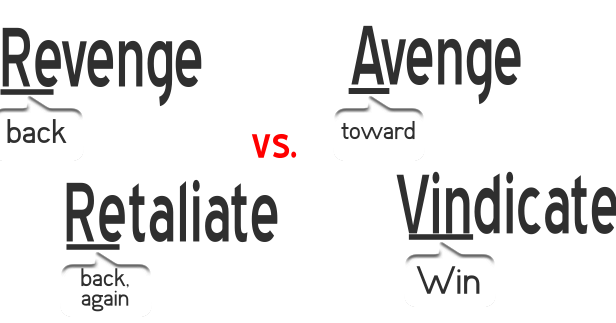
Revenge Avenge Retaliate Vindicate How To Use Them In Sentence Make Your English Easy
Avenge and vengeance difference
Avenge and vengeance difference-Apr 26, 21 · The Bible has a great deal to say about revenge Both the Hebrew and Greek words translated "vengeance," "revenge," and "avenge" have as their root meaning the idea of punishment This is crucial in understanding why God reserves for Himself the right to avenge The key verse regarding this truth is found in the Old Testament andAvenge is a verb To avenge is to punish a wrongdoing with the intent of seeing justice done Revenge can be used as a noun or a verb It is more personal, less concerned with justice and more about retaliation by inflicting harm Actually he wants to avenge Soniya's death They're consumed with hatred and revenge




Avenge Revenge Cat Wordpandit
Apr 21, 08 · Synonyms Avenge, Revenge Until lately these words were used with little or no difference of meaning (see quotations under each) Avenge is now restricted to the taking of just punishment or the vindication of justice, and revenge to the infliction of pain or evil to gratify resentful feelings, or the desire of retaliation for some real orFeb 23, 15 · Therefore, the difference between Revenge and Retribution is fairly simple to understand • To begin with, Retribution is a form of punishment imposed by law and legally authorized • Revenge, in contrast, is a form of personal punishment, one not sanctioned by law • The ultimate goal of Retribution is to punish the wrongdoer or offenderFeb 14, 13 · Venge, an obsolete variant, is the basis of the noun vengeance, which has a literal meaning nearly synonymous with revenge (as with avenge and the verb revenge, vengeance has a more elevated connotation than the noun revenge), but in the idiomatic phrase "with a vengeance," it means "excessively" or "vehemently"
Revenge is ( usually) a noun People avenge something or avenge themselves When revenge is a verb, there is no difference between it and avenge Both mean to seek or get vengeance Yet while this use of revenge is many centuries oldAvenge (verb) Inflict harm in return for an injury or wrong done to oneself or another Revenge (noun) The action of hurting or harming someone in return for an injury or wrong suffered at their hands Vengeance (noun) Punishment inflicted or retribution exacted for an injury or wrong Avenge is a verbThe verbs avenge and revenge mean basically the same thing, but avenge is widely perceived as having nobler connotations than revenge Both words, like the English word vindicate, derive from the Latin verb vindicare/vendicare "to claim, to set free, to punish"
Aug 10, 19 · Avenge Me (Fifth Avenue Trilogy, #1) by Maisey Yates So let me start you off with the gist right away Avenge is a verb;May 13, 21 · What is the difference between vengeance and revenge?May 12, 11 · While avenge is a verb, revenge can be both verb as well as a noun Revenge also has similar meaning to avenge, but justice takes a back seat and the focus is to inflict harm on the other person by the use of violence However, revenge can be an insult or a taunt in words and not necessarily physical in the true sense of the term




The Big Difference Between Revenge And Justice And Why Justice Is Better




Difference Between Avenge And Revenge
Aug 24, 16 · Justice refers to the process of law where the wrongdoers are judged and punished fairly Revenge is the act of harming or hurting someone as a punishment for something they have done The main difference between justice and revenge is their aim;Apr 26, 07 · revenge and vengeance are nouns vengeance is more abstract, meaning something more like the desire to take revenge or the perceived right to take revenge avenge is the verb which means to take revenge Of the three, revenge is probably the most frequently used See http//wwwbartlebycom/68/44/644htmlDifference between Revenge and Vengeance Key Difference In terms of context, revenge is more personal, while the use of the term vengeance implies justice and honor Vengeance implies righteousness, whereas revenge is dirty, vile or cheap depending on the situation used




Difference Between Avenge And Revenge




Vengeance Vs Revenge What S The Difference The Word Counter
Retaliation While revenge can function as a verb, it is much more common for it to be seen as a noun He was so blinded by a desire to get revengeAvenge is a verb To avenge is to punish a wrongdoing with the intent of seeing justice done Revenge can be used as a noun or a verb It is more personal, less concerned with justice and more about retaliation by inflicting harmAvenge is a verb that is roughly in lines with "to retaliate" You avenge a harm by harming the offending party Revenge is a noun It is the actual act of retaliation against the offending party Vengeance can be a synonym for revenge, or it can mean the general desire for revenge 3




Revenge Vs Avenge Vs Vengeance Youtube




Easilyconfusedwords Avenge Vs Revenge Youtube
Justice aims to right a wrong whereas revenge simply aims to get even This article looks at, 1I'd stress what dude said in #4 the connotations may be different Nowadays "revenge" may evoke something more along the lines of The Count of Monte Christo, Death Wish or Kill Bill, a "roaring rampage of revenge" that is less about justice and more about personal satisfaction"Avenge" doesn't have quite the same bloodthirsty undertone eg Marvel's Avengers are clearly goodIs that vendetta is a bitter, destructive feud, normally between two families, clans or factions, in which each injury or slaying is revenged a blood feud while revenge is any form of personal retaliatory action against an individual, institution, or group for some perceived harm or injustice



What Is The Difference Between Revenge And Vengeance Quora



What Is Said About Getting Revenge In The Bible Quora
Revenge is (usually) a noun People avenge something or avenge themselves on somebody "She vowed to avenge her brother's death" "He later avenged himself on his wife's killers"You take revenge on a person In more formal or literary English, Revenge can also be a verb People revenge themselves on somebody or are revenged on them (with the sameMar 02, 21 · 1I wonder whether the word "avenge" implicits they avengers are doing something for justice while the word "revenge" refers to something negative 2As I know, "avenge" is a transitive word But I am not sure whether the sentences below all make sense (a) He avenged his father on the murderer (b) He avenged his father's death (c) He avenged the murderer whoWelcome to English Quiz Lab!#shortsAVENGE vs REVENGEDifference between AVENGE and REVENGE🔔Subscribe to the channel for more interesting shorts and other v




What Is The Difference Between Revenge And Vengeance Quora




Vengeance Meaning Youtube
Both verbs are followed by the preposition on or for avenge (or revenge) oneself on someone, for somethingRevenge is both a noun and a verb and generally means the act of taking vengeance for injuries or wrongs;Revenge is more like a retaliation for personal reasons than seeking justice for greater good So, always remember that avengers are the ones seeking justice for others whereas Revengers do so more out of their own personal vengeance Rate this article (500 / 1 vote) Email Print




Avenge Or Revenge




Pdf Revenge The Volcano Of Despair The Story Of The Israeli Palestinian Conflict Helena Yakovlev Golani Academia Edu
Dec 07, · The word vengeance is universally recognized and used as a noun, meaning that it describes a specific thing Vengeance is the noun used to describe the action of revenge On the other hand, revenge can be both a verb and a noun, and derives its meaning depending on which part of speech it takesRevenge is something personal, an act against someone who did something Avenge is (lets say, revenge taken) for someone else eg you Avenge your brother's death!Mar 02, 21 · 1I wonder whether the word "avenge" implicits they avengers are doing something for justice while the word "revenge" refers to something negative 2As I know, "avenge" is a transitive word But I am not sure whether the sentences below all make sense (a) He avenged his father on the murderer (b) He avenged his father's death




The Yuniversity Yo Grammar What S Up With Avenge And



3
Also "revenge" is a noun (revenge is best served cold) while "avenge" is a verb (I want to avenge someone) EDIT Tom Margolis pointed out that "Avenge" doesn't have to be involved specifically between "you and your villain" So just follow the definition of "avenge" that I wrote before that, the Red Clan one 221K viewsAvenge or Revenge After having cleared cutoff percentile at MBA Institute, you will be invited for Group Discussion and now it is must for you to practice with variety of GD topics Following comparisons do come up situation wise in both our life and career cycleMay 14, 14 · But vengeance is not evil, it is a form of justice Just punishment is when the severity of the punishment equals the severity of the crime, and when that just punishment has been exacted, vengeance has been accomplished The comfort here is that God's promise to avenge his people should be enough for us to know that we will be avenged








Avenge Vs Revenge Difference And Comparison Diffen
We use the word "revenge" for situations describing personal hurt, eg, the best way to "revenge" is by ignoring her and moving on "Avenge" is used when the situation is about a third party hurt, eg, the boy "avenged" his brother's death by murdering his killer There is a lot of difference between these words, and thereSep 24, 08 · The difference between the words of avenge and revenge is simple Avenge is seeking to get back at someone on somebody else's behalf who has wronged themAs nouns the difference between revenge and vengeance is that revenge is any form of personal retaliatory action against an individual, institution, or group for some perceived harm or injustice while vengeance is revenge taken for an insult, injury, or other wrong
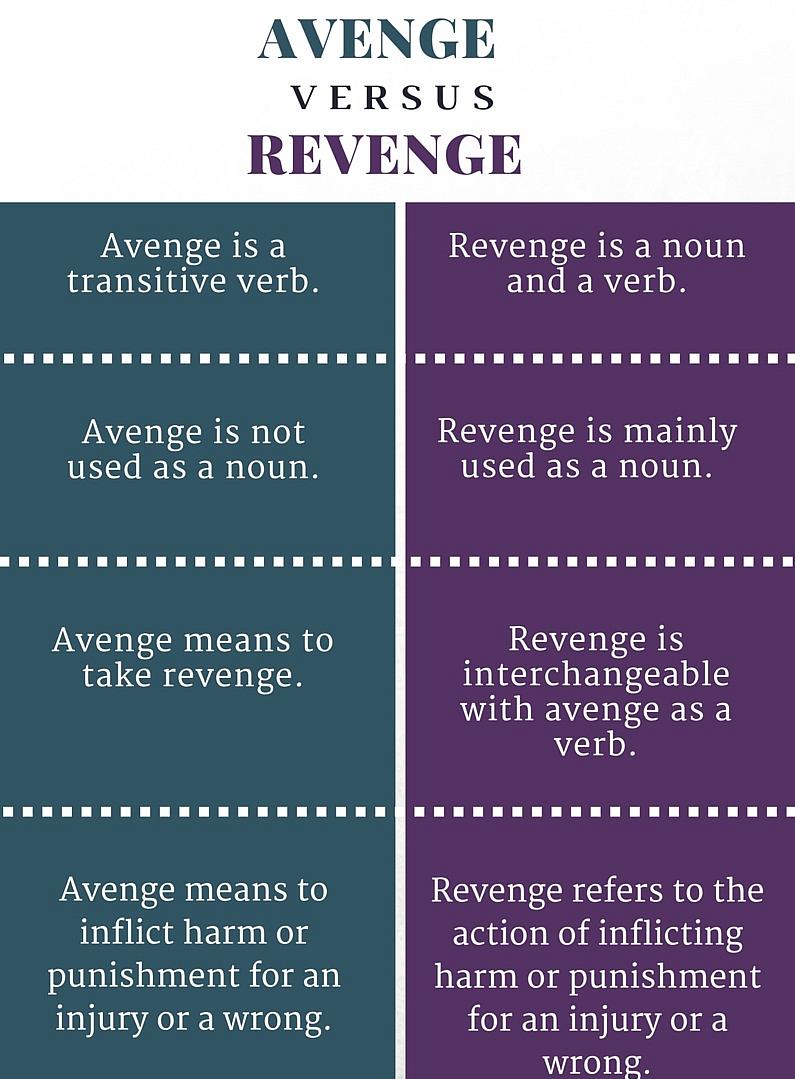



Verschil Tussen Avenge En Revenge Taal Het Verschil Tussen Vergelijkbare Objecten En Termen




What Is The Difference Between Revenge Avenge And Vengeance Quora
Definition of avenge in the Definitionsnet dictionary Meaning of avenge What does avenge mean?Information and translations of avenge in the most comprehensive dictionary definitions resource on the webVengence is an (act already done) to avenge, or take revenge




Vengeance Vs Revenge What S The Difference The Word Counter



Difference Between Revenge And Vengeance Revenge Vs Vengeance
Jan 25, 19 · Revenge (noun) A win by the previous loser Revenge (verb) To take one's revenge (on or upon) someone Revenge (verb) To take revenge for (a particular harmful action), to avenge "Arsenal revenged its loss to Manchester United last time with a 50 drubbing this time" Revenge (verb) To take vengeance;Avenge is a verb To avenge is to punish a wrongdoing with the intent of seeing justice done Revenge can be used as a noun or a verb It is more personal, less concerned with justice and more about retaliation by inflicting harmA revenge As a verb avenge is




Don T Confuse Revenge With Justice Five Key Differences Psychology Today




Revenge Avenge Retaliate Vindicate How To Use Them In Sentence Make Your English Easy
One of the primary difference between them is the fact that revenge is a noun, whereas avenge is a verb Basically, this means that revenge is a thing that someone may want, however, avenge is something that they do Example I will avenge you father Once I kill him, I will have my revengeOct 16, · However, a quick grammatical trick to detect or distinguish them is to know that revenge can be used as a noun and a verb while avenge can only function as a verb Finally, revenge is more desperate and strongwilled to return deeds and punishment than avengeAvenge is a verb;




Difference Between Revenge Avenge Youtube




Hey Marvel What S With Avengers Who Don T Avenge Blog Excerpts Vocabulary Com
Sep 23, 18 · Hamlet's revenge is delayed in three significant ways First, he must establish Claudius' guilt, which he does in Act 3, Scene 2 by presenting the murder of his father in a play When Claudius storms out during the performance, Hamlet becomes convinced of his guilt Hamlet then considers his revenge at length, in contrast to the rashPerbedaan Avenge vs Revenge vs Vengeance Jika diartikan dalam bahasa Indonesia, antara avenge, revenge dan vengenance memiliki arti atau makna yang sama yakni balas dendam Namun ketiga kata tersebut tidak bisa menggantikan antaraTo avenge is to punish a wrong with the idea of




Violence Revenge And Metaphor In Aeschylus S Oresteia In Revenge Agency And Identity From European Drama To Asian Film
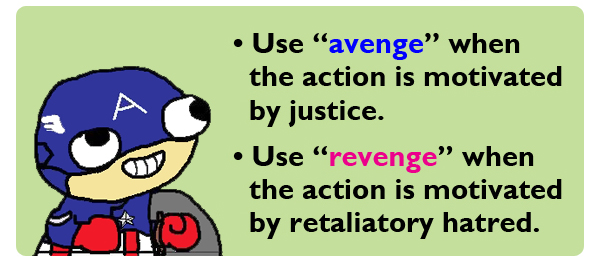



Righting Wrongs Differentiating Revenge And Avenge
Avenge meaning 1 to do harm to or punish the person responsible for something bad done to you or your family or Learn moreAvenge, revenge, vengeance Avenge means to seek justice or to right wrongs fairly In suing, Janet simply wanted to avenge her losses Revenge means to look for reprisal I will revenge myself if it's the last thing I do!May 11, 19 · "When I left my wife, she tried to set fire to the house in revenge" Revenge (noun) A win by the previous loser Revenge (verb) To take one's revenge (on or upon) someone Revenge (verb) To take revenge for (a particular harmful action), to avenge "Arsenal revenged its loss to Manchester United last time with a 50 drubbing this time" Revenge (verb)




What Is The Difference Between Justice And Revenge Moral Paradigm




Avenge Vs Revenge What S The Difference Writing Explained
Dec 11, 07 · Revenge applies to actions you take against people who wrong you in an effort to get even Example He cheated on her so to get revenge she smashed his car Avenge applies to actions you take against people who wrong others Example To avenge his sister's attacker, he shot the man Retaliate applies to actions taken in response to someone who wrongs youOct 14, 19 · When to use avenge Avenge can only act as a verb It comes from the Latin word for vindicate and entered English in the 1300's Like revenge, it means to get vengeance However, unlike revenge, it has the connotation of getting vengeance in order to right a wrongDeftsterdesigns Revenge And Avenge Difference It is used to punish a wrong by going outside the law And to use these two words fittingly and accurately, it is necessary to study them There is a quote about that may imply the difference, the quote by samuel johnson revenge is an act of passion;




Difference Between Revenge And Avenge Compare The Difference Between Similar Terms




Avenge Meaning Youtube




Framenet The Work The Product The Applications Cjfillmore Icsi Berkeley Ppt Download




What Is The Difference Between Revenge And Vengeance Quora




Where An Eye For An Eye Should Be The Letter Of The Law Innovation Smithsonian Magazine




Vindicate Avenge And Revenge



3




Revenge Vs Vengeance What S The Difference Ask Difference




Vengeance Quotes Quotesgram




What Is The Difference Between Revenge Avenge And Vengeance Quora




Andy Dilnot There S A Big Difference Between Justice Vengeance Do Not Take Revenge My Dear Friends But Leave Room For God S Wrath For It Is Written It Is Mine




Where Do You Define The Line Between Vengeance And Justice Quora




What Is The Difference Between Revenge Avenge And Vengeance Quora




Word Confusion Avenge Vs Revenge Vs Vengeance Kd Did It Edits



Avenge Vs Revenge What S The Difference Writing Explained




Revenge And Vengeance Comics Amino




Blue Ruin Vengeance Or Revenge Http Bit Ly Getblueruin Facebook




Revenge Vs Vengeance What S The Difference Ask Difference



Movies Language The Avengers Vs The Revengers




Framenet The Work The Product The Applications Cjfillmore Icsi Berkeley Ppt Download




Revenge Meaning Archives Pediaa Com




Difference Between Avenge And Revenge



Difference Between Justice And Revenge Definition Meaning Usage




Avenge Vs Revenge Youtube




There S A Difference Between Wanting Justice From Our Creator Jehovah And Wanting Vengeance Seeking Revenge Will Only In 21 Love Life Quotes True Words Life Quotes
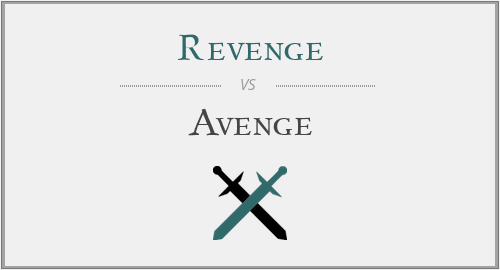



Revenge Vs Avenge




Avenge Revenge Cat Wordpandit




Avenge Vs Revenge Difference And Comparison Diffen




What Is The Difference Between Revenge Avenge And Vengeance Quora




Should We Say Revenge Or Avenge Are These The Same




Samuel Johnson Revenge Is An Act Of Passion Vengeance




The Fine Art Of Revenge Salon Com




What Is The Difference Between Revenge And Vengeance Quora




What Is The Difference Between Revenge And Vengeance Quora



Avenged Quotes Avenged Sayings Avenged Picture Quotes




Revenge Vs Vengeance What S The Difference Ask Difference




The Big Difference Between Revenge And Justice And Why Justice Is Better




What Does The Bible Say About Revenge Gotquestions Org




Notes Towards A Materialist Theory Of Revenge The Lives Of Witches By Max Haiven Rival Vagabonds Medium




The Complicated Psychology Of Revenge Association For Psychological Science Aps




Pdf Examining The Relations Between Revenge Forgiveness And Guilt Levels Of High School Students




What Is The Difference Between Revenge Avenge And Vengeance Quora




Frame Net What How And Why C J




What Is The Difference Between Justice And Revenge Quora




Should We Say Revenge Or Avenge Are These The Same




Word Confusion Avenge Vs Revenge Vs Vengeance Kd Did It Edits




Revenge Vs Vengeance What S The Difference Ask Difference




What Is The Difference Between Revenge And Vengeance Quora




What Is The Difference Between Justice And Revenge Moral Paradigm




Avenge Revenge 차이 To Take Revenge For A Particular Harmful Action To Avenge




Retribution And Revenge Springerlink




Here S The Difference Between Vindication Revenge Be Blesstified



1
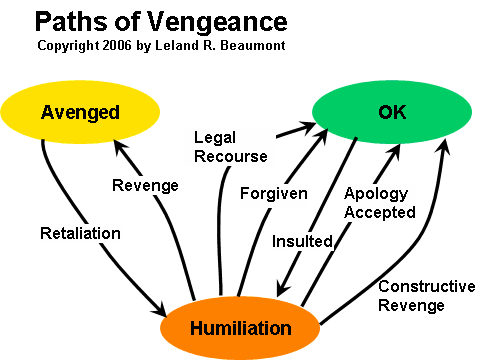



Emotional Competency Revenge




Doc Shakespeare And Vengeance Yaritza Rivera Academia Edu




Word Confusion Avenge Vs Revenge Vs Vengeance Kd Did It Edits




Should We Say Revenge Or Avenge Are These The Same




Reeking Vs Wreaking What S The Difference Dictionary Com




Pdf The Economy Of Vengeance Some Considerations On The Aetiology And Meaning Of The Business Of Revenge



Difference Between Revenge And Avenge Revenge Vs Avenge



1




Revenge And Vengeance Comics Amino
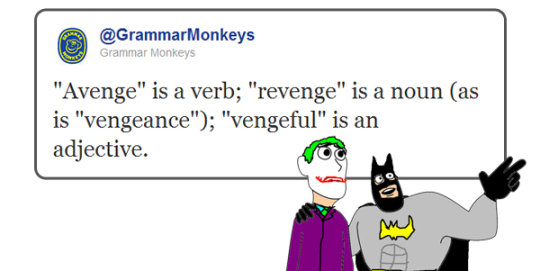



The Yuniversity What S Up With Avenge And Revenge




Word Confusion Avenge Vs Revenge Vs Vengeance Kd Did It Edits



Difference Between Revenge And Vengeance Revenge Vs Vengeance




Avenge Vs Revenge




Revenge Vs Vengeance What S The Difference Ask Difference




Revenge Vs Vengeance What S The Difference Ask Difference



Difference Between Revenge And Avenge Revenge Vs Avenge




Avenge Vs Revenge What S The Difference Writing Explained




Revenge Avenge Retaliate Vindicate How To Use Them In Sentence Make Your English Easy



Difference Between Justice And Revenge Definition Meaning Usage




51 Revenge Quotes To Remind You The Evils Of Vengeance Trialsandtests



Avenge Vs Revenge How To Use Each Correctly Enhancemywriting Com




Pin On Grammar Tips




What Does The Bible Say About Revenge And Is It Always Wrong


コメント
コメントを投稿